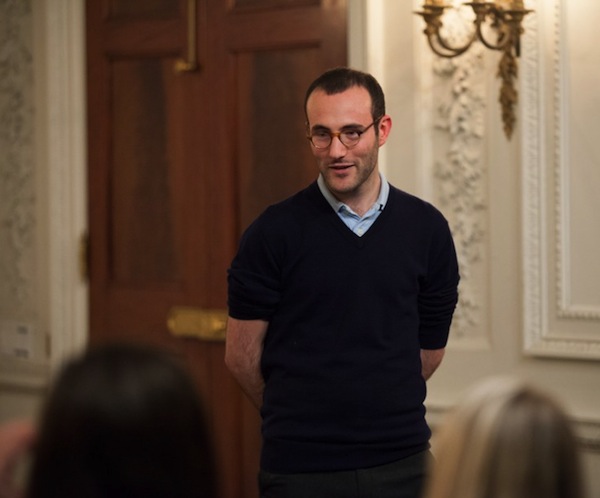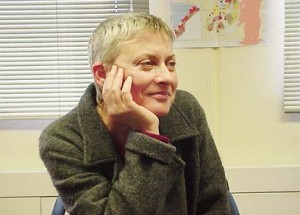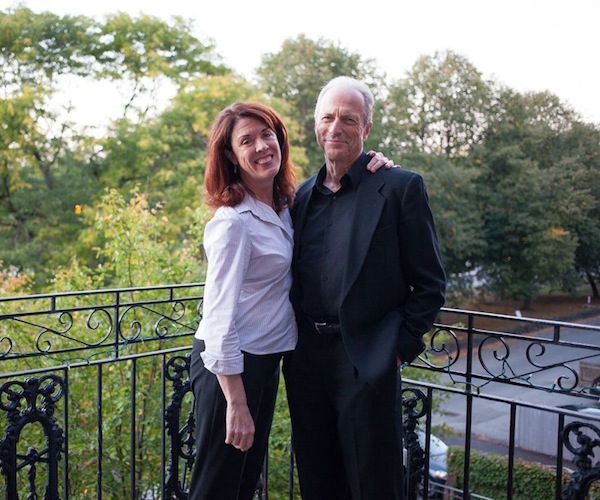Theater Feature: Israeli Stage Presents a Deliciously Amusing “Oh God”
Oh God meets all of Guy Ben-Aharon’s criteria for Israeli Stage: an outrageously risky idea for a play, complex characters, and writing that embodies an unmistakably Israeli point of view on universal themes.
Oh God, by Anat Gov. Translated by Anthony Berris and Margalit Rodgers. Directed by Guy Ben-Aharon. An Israeli Stage staged reading with Will Lyman and Maureen Keiller, at Brown University-RISD Hillel, Providence, Rhode Island, on October 4.
By Helen Epstein
Sunday evening I saw my first staged reading by Israeli Stage, one of three series – including German Stage and Swiss Stage – that aim to expose audiences to foreign plays in English translation. Israeli Stage is the creation of an impossibly young (twenty-three-years-old), savvy and energetic Director/Producer Guy Ben-Aharon, who told me that the project had two crucial components. The plays have to be “written by an Israeli playwright with universal themes that connect non-Israelis to the work. Much of our audience is not Jewish and has no connection to Israel. I’m interested in cultural bridges. If there were a Syrian Stage we would surely understand what’s going on there better than we do now. I think art explains things better than news reports.”
Ben-Aharon takes Israeli Stage’s theatrical tasting menu to people who find traditional theater too expensive or too difficult to get to: students, seniors, people who can’t afford sixty-dollars-and-up seats plus parking. “I’m a young person,” says the recent Emerson graduate. “I know it’s expensive and time-consuming to go to the theater. Staged readings are affordable, allow us to tour, take plays to college campuses and other venues. I think readings ask the audience to be much more imaginative than they need to be at a full production, Should someone endow us with a million dollars I would still go on doing them. We’ve produced twelve plays by eight playwrights in three years with a major diversity of subjects and themes.”
Producing a series of staged readings, of course offers a multi-talented and enterprising theater person a way into the notoriously expensive world of theater. Ben-Aharon, who was born in Israel and moved to Brookline at the age of nine, produces, directs, does his own marketing and publicity and, in the case of his forthcoming adaptation of David Grossman’s To the End of the Land, even writes the script. While his actors are paid Equity wages and rehearse more than average (fifteen hours for three performances of Oh God) and he himself is paid on a per project basis, Ben-Aharon is able to produce a stage reading at about a fifth to a quarter of what a full production might cost.
He visits theaters in Tel Aviv, Haifa, Jerusalem and Beer Sheva a couple of times every year to hunt for new work and meet with Israeli playwrights. He aims for a diverse menu of plays, commercial and fringe, and says he’s particularly interested in work by and about women such as the late Anat Gov’s Oh God — Israeli Stage’s second reading of play by Gov (here is The Arts Fuse review of the first, Best Friends).
Oh God, the seventy-minute comedy which I saw at the Goethe Institute in Boston’s Back Bay (and which was performed at Boston University’s Hillel House on September 30), will be at Brown University-RISD Hillel this Friday on October 4. It meets all of Ben-Aharon’s criteria for Israeli Stage: an outrageously risky idea for a play, complex characters, and writing that embodies an unmistakably Israeli point of view on universal themes. It pairs Ella — a harried, divorced psychologist/psychotherapist and mother of an autistic son — with a new and unexpected patient: God.

Israeli Stage’s impossibly young (twenty-three-years-old), savvy and energetic Director/Producer Guy Ben-Aharon.
God-wrestling has been a Jewish pastime for millennia and perhaps nowhere has the struggle between devout and secular been as abrasive as it is in contemporary Israel. Faith in science and psychology, for many secular Jews inside Israel and out, has replaced faith in God (The popular HBO series In Treatment originated as a television series in Israel). In Gov’s clever take, God arrives in Ella’s garden for treatment. He’s depressed. He wants to be listened to, understood, helped.
At first, Ella doesn’t know what to make of her unusual patient. Does he work for the Mossad? How does he know so much about her? Is he deranged? Ella tries to give him a referral to a psychiatrist who could prescribe medication but, after God repeatedly refuses to leave, they get to work.
This is a delicious script, ably translated and full of great lines that reflect the way characters, phrases and situations from the Tanach (the Old Testament) imbue daily life and culture in Israel in a way that is accessible to audience members who know nothing about the country. Ben-Aharon casts mostly local actors whose work he has been following for years. While The Arts Fuse does not review staged readings, I can say that Maureen Keiller made an interesting Ella and Will Lyman a compelling God.
I very much hope a local theater will work with Ben-Aharon on the full production that Oh God deserves.
Helen Epstein is the author of the biography of theater producer Joe Papp and other books on the arts, available from Plunkett Lake ebooks.



How can I find the play, Oh God by Anat Gov in English translation so I can read it on my own?